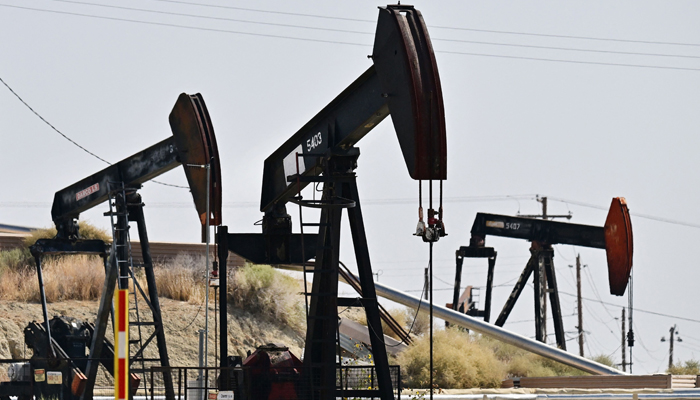Oil rises 1pc as more tankers avoid Red Sea
HOUSTON: Oil rose over 1 percent on Friday, as an increasing number of oil tankers diverted course from the Red Sea following overnight air and sea strikes by the U.S. and Britain on Houthi targets in Yemen after attacks on shipping by the Iran-backed group.
Brent crude futures were up 90 cents, or 1.13 percent, at $78.31 a barrel at 17:11 GMT. During the session they had climbed over $3 to more than $80. U.S. West Texas Intermediate crude futures climbed 88 cents, or 1.15 percent, to $72.85. It was up more than $3 at its session high.
Both benchmarks were on course to close lower for the week as sharp price cuts by top exporter Saudi Arabia and a surprise build in U.S. crude stocks this spurred supply worries. "While crude supply and demand had been approaching equilibrium with prices near $70 per barrel, the escalation of tensions in the Middle East is now taking precedence and very well could place a $5-$7 a barrel premium to crude futures in the near term," said Dennis Kissler, senior vice president of trading at BOK Financial.
Tanker companies Stena Bulk, Hafnia and Torm all said they had decided to halt all ships heading towards the Red Sea. The U.S. and UK strikes come in retaliation for Houthi attacks since October on commercial vessels in the Red Sea, concentrated on the Bab al-Mandab Strait to the southwest of the Arabian Peninsula, in a show of support for Palestinian militant group Hamas in its fight against Israel.
The escalation has fed worries the Israel-Hamas war could widen into a broader conflict in the Middle East, disrupting oil supplies. That includes the important Strait of Hormuz, on the opposite side of the Arabian Peninsula, between Oman and Iran. Iran seized a tanker on Thursday carrying Iraqi crude south of the strait destined for Turkey.
"Although the lack of shipping through the Red Sea... does create transportation issues for some crude supplies, the impact on the physical oil markets is, thus far, minimal," said Matt Stephani, president at investment advisory firm Cavanal Hill Investment Management.
"If the conflict were to spread to the other side of the Arabian peninsula... oil markets may react much more significantly," Stephani added. Diversion of tankers around South Africa will also push up freight rates as ships take longer, more costly routes. Red Sea, a key route between Europe and Asia, accounts for about 15 percent of the world's shipping traffic.
U.S. President Joe Biden said the "targeted strikes" in Yemen were a clear message that Washington and its partners will not "allow hostile actors to imperil freedom of navigation". A Houthi spokesperson said the group would continue to target shipping heading toward Israel. Iran warned that the U.S.-Britain attack on Houthis will fuel "insecurity and instability" in the region, according to Iranian state media.
-
 Northern Lights: Calm Conditions Persist Amid Low Space Weather Activity
Northern Lights: Calm Conditions Persist Amid Low Space Weather Activity -
 'Look What Andrew Has Done': Meghan Markle Defended On Jeremy Vine Show
'Look What Andrew Has Done': Meghan Markle Defended On Jeremy Vine Show -
 Apple, Google Agree To Make 'app Store' Changes Over UK Regulator Concerns
Apple, Google Agree To Make 'app Store' Changes Over UK Regulator Concerns -
 Autodesk Files Lawsuit Against Google Over AI Video Tool Trademark Dispute
Autodesk Files Lawsuit Against Google Over AI Video Tool Trademark Dispute -
 San Francisco 49ers Player Shot Near Post-Super Bowl Party
San Francisco 49ers Player Shot Near Post-Super Bowl Party -
 Kardashian-Jenner Clan Brings Lewis Hamilton Into The Fold: Watch
Kardashian-Jenner Clan Brings Lewis Hamilton Into The Fold: Watch -
 Meghan Markle 'quietly Dreaded' As Ex-best Friend Receives Lucrative Offer For Bombshell Memoir About Duchess
Meghan Markle 'quietly Dreaded' As Ex-best Friend Receives Lucrative Offer For Bombshell Memoir About Duchess -
 Blake Shelton, Gwen Stefani Make Big Move To Save Their Marriage
Blake Shelton, Gwen Stefani Make Big Move To Save Their Marriage -
 Google Warns Of State-sponsored Cyberattacks Targeting Defense Sector Employees
Google Warns Of State-sponsored Cyberattacks Targeting Defense Sector Employees -
 Ransom Deadline Passes: FBI Confirms ‘communication Blackout’ In Nancy Guthrie Abduction
Ransom Deadline Passes: FBI Confirms ‘communication Blackout’ In Nancy Guthrie Abduction -
 Jeff Bezos Hints At Blue Origin Moon Plans As Elon Musk Responds With Cautious Praise
Jeff Bezos Hints At Blue Origin Moon Plans As Elon Musk Responds With Cautious Praise -
 Zach Bryan Slams Turning Point USA Alternative Halftime Show: 'Embarrassing As Hell'
Zach Bryan Slams Turning Point USA Alternative Halftime Show: 'Embarrassing As Hell' -
 South Korea Blames Coupang Data Breach On 'management Failures,' Not Cyber Attack
South Korea Blames Coupang Data Breach On 'management Failures,' Not Cyber Attack -
 ‘Disgraced’ Andrew More Concerned About ‘issue Of His Legacy’ Than Epstein Links
‘Disgraced’ Andrew More Concerned About ‘issue Of His Legacy’ Than Epstein Links -
 Instagram Plans New Snapchat-style App ‘Instants’ Amid Rising AR Competition
Instagram Plans New Snapchat-style App ‘Instants’ Amid Rising AR Competition -
 Safer Internet Day 2026: Is Social Media Ban The Only Way To Protect Kids?
Safer Internet Day 2026: Is Social Media Ban The Only Way To Protect Kids?




